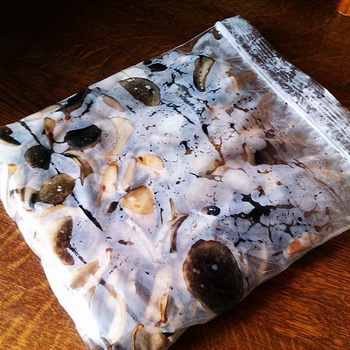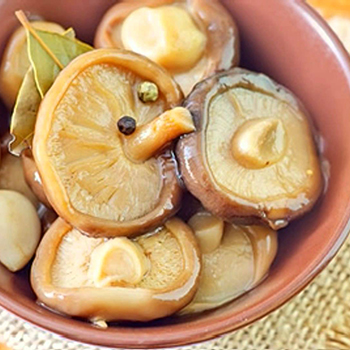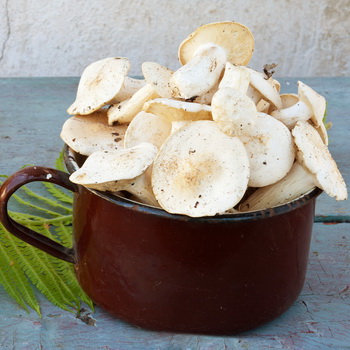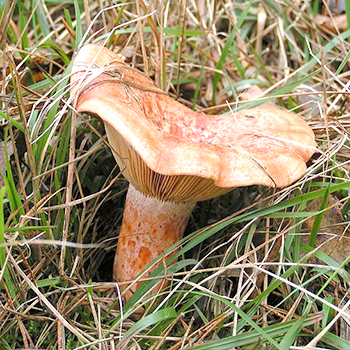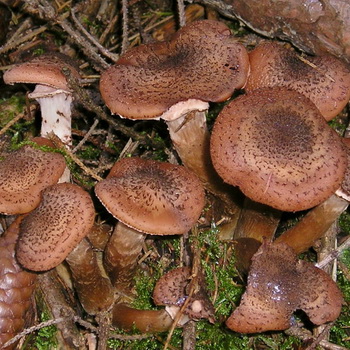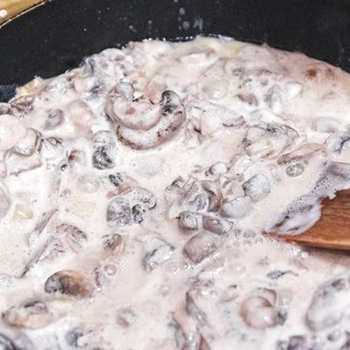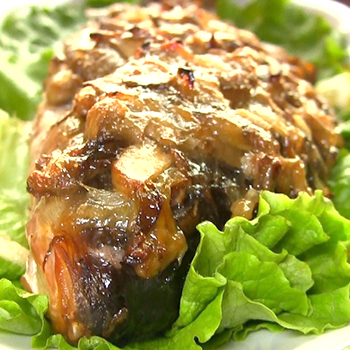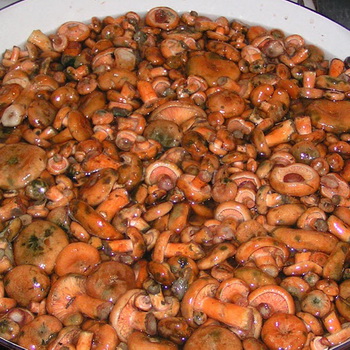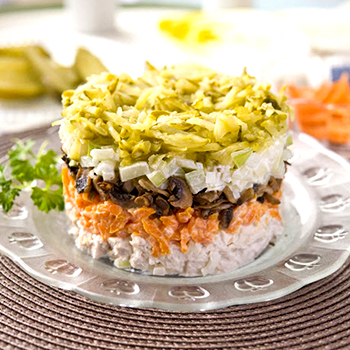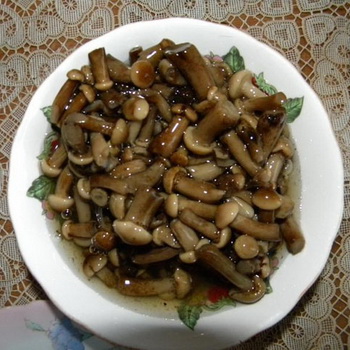Overgrown adult mushrooms: a photo of what edible autumn overgrown mushrooms look like and is it possible to eat them
 Surely many of us have come across these interesting and "cute" mushrooms at least once in our lives. "Silent hunting" for honey agarics is always very exciting and useful, because along with pleasant outdoor recreation, you can pick up a whole basket of edible fruit bodies. Moreover, this can be done in just one small area, so to speak, "without leaving the cash register." The fact is that honey mushrooms always grow in friendly families, so such a find is a real joy in harvesting mushroom crops.
Surely many of us have come across these interesting and "cute" mushrooms at least once in our lives. "Silent hunting" for honey agarics is always very exciting and useful, because along with pleasant outdoor recreation, you can pick up a whole basket of edible fruit bodies. Moreover, this can be done in just one small area, so to speak, "without leaving the cash register." The fact is that honey mushrooms always grow in friendly families, so such a find is a real joy in harvesting mushroom crops.
What mushrooms are considered overgrown and is it possible to eat old mushrooms?
Often, our searches are designed for strong, young mushrooms that are perfect for pickling and other processing processes. However, overgrown mushrooms can often be found in the forest. What to do in this case: walk by or take them with you? Is it possible to eat old overgrown mushrooms, and if so, what dishes are they suitable for? In this article, we will show you photos of overgrown mushrooms and tell you what you can do with them.


To know which mushrooms are considered overgrown, you need to familiarize yourself with the appearance of their younger "brothers". It is not difficult to identify this mushroom in the forest. In addition to the fact that they grow in whole colonies, there are many more characteristic descriptions. By its nature, honeydew has a thin and flexible leg, the height of which can reach 15 cm. Edible species also have a ring-skirt, which is one of the main differences from false twins. The cap of the young honeydew is lamellar and has a hemispherical shape, the diameter of which is 2-6 cm. Small scales are visible from above, and the color of the cap ranges from cream to reddish and even brown. The plates of the fungus are rather rare, as if ingrown into the leg.
Honey mushrooms are considered very tasty mushrooms with a delicate grayish-white pulp and a pronounced aroma. You can meet these fruiting bodies both in coniferous and deciduous forests. Honey mushrooms prefer to grow mainly on stumps, hence their characteristic name. Therefore, pay attention to forest clearings and ravines. In addition, these mushrooms can be found on the roots of trees, as well as simply on the ground. You can often find a colony of honey agarics on the trunks of drying trees.
Since the mushroom mushroom is a perishable product, it should be processed as soon as possible. These fruiting bodies are most often used fresh for preparing first and second courses, snacks, sauces, as well as fillings for flour products. They are fried, stewed, canned, salted, dried and frozen. Often, the legs of mushrooms are not eaten, as they are quite tough.
But despite the preference to look for young mushrooms, some mushroom pickers are not averse to picking up overgrown edible mushrooms. If a batch of such mushrooms appeared in front of you in the forest, then you will ask a completely natural question: is it possible to collect overgrown mushrooms or is it better not to touch them?
What adult overgrown mushrooms look like: photo and description
Now, having discussed the general characteristics of a young mushroom, you can get acquainted with how adult mushrooms look like. It is worth noting that representatives of these two age categories differ somewhat in appearance. The following photos and descriptions will help you see what overgrown mushrooms look like.


As already noted, young mushrooms have a hemispherical cap, as shown in the photo, and in overgrown mushrooms, the hat is leveled. With age, the upper part of the fruiting body acquires the shape of an umbrella - there is a small bulge on top, then a plane, which is slightly rounded at the sides.The hat of a mature individual has a diameter of 5 to 11 cm.


The edible young honey agaric is covered with small scales, which cannot be said about their adult “colleagues”. With age, the cap of the mushroom loses these scales and becomes almost smooth. In addition, it loses the oily layer, which is sometimes inherent in some edible mushrooms.
As shown in the photo below, the flesh of adult edible mushrooms has a noticeable coarse consistency compared to young individuals:

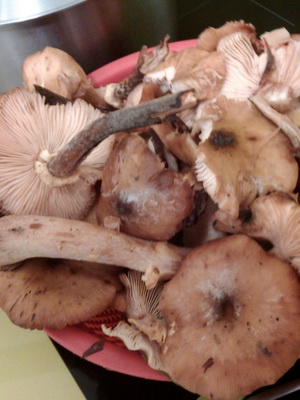
Also, with age, the pulp of the mushroom becomes less dense and more fibrous. In addition, you can also pay attention to the color of the plates. In young specimens, they have a white or flesh tint, but over time they acquire darker tones - pink or light brown. Sometimes the plates can be covered with brown spots. However, all these characteristics do not affect the pleasant smell and taste of the fruiting body. But still it should be remembered that adult mushrooms do not have such a pronounced forest aroma, therefore they are less appreciated in cooking.
It is also known that with age, the "skirt" of honey agaric becomes barely noticeable, and in some cases even disappears altogether. It is very important to remember this point, since the absence of a ring on the leg in young specimens indicates inedibility. Therefore, only those mature mushrooms should be collected in which you are sure that they belong to the category of edible fruit bodies.
As you can see, as mushrooms mature, they not only become larger in size, but also have a changed structure. There have been cases when one mature specimen could weigh up to 300 g.
We offer you to see a few more photos showing how the overgrown edible mushrooms look like:


Autumn honey fungus is considered one of the most popular representatives of mushrooms in the northern part of Russia. This is an edible species of fruiting bodies of the physalacria family, a genus of honey agaric. This fungus is parasitic, often grows in families, but there are also single specimens. The honey agaric "settles" on living trees and bushes, dead stumps, fallen trunks and large broken off branches. The fruit body grows in deciduous and coniferous forests from late August to mid-November, depending on the region.
It should be noted that young and adult autumn mushrooms differ from other species in rather noticeable signs. So, the size of the cap of a young specimen is up to 10 cm, and adults are known for even larger dimensions. An overgrown autumn mushroom hat can reach a diameter of 17 cm.
Young honey agarics have a well-defined "skirt" on the leg, which becomes less noticeable with age. In addition, the surface of the entire fruiting body, including the stalk, is covered with dense scales. However, as shown in the photo, in overgrown autumn mushrooms, these scales disappear, so the surface of the cap dries up and becomes smooth:


Another interesting feature showing how adult autumn mushrooms look like is the presence of spores. The fact is that the spores of the fungus at a young age are white, so their "older" counterparts often have a hat that seems "musty".
Plates of overgrown autumn mushrooms change their color. If at a young age they are white and yellow, then over time they become creamy brown. However, it should be said that all of the above features do not affect the taste and aroma of the mushroom pulp, with the exception of rotten and wormy individuals. And although the aroma becomes less noticeable with age, some mushroom pickers do not mind collecting and cooking them.
Autumn mushrooms have an amazing property to glow at night. The mycelium, wrapping its thin threads around a rotten stump, is capable of illuminating it from the inside. What do overgrown mushrooms look like, given this unique feature? Unfortunately, huge specimens almost completely lose it.
Are overgrown mushrooms dangerous for adults?
Almost all mushroom pickers who come across mature mushrooms ask this question.After all, it is known that all types of fruiting bodies, without exception, absorb radiation and salts of heavy metals. And the older the mushroom, the more it absorbed harmful substances from the air. Are overgrown mushrooms dangerous in this case?
I must say that it is quite rare to find an overgrown honey fungus that will have quality indicators. The state of the fruiting body can be seen from its appearance. As a rule, overgrown mushrooms change for the worse over time. The structure of his body is destroyed, and as a result, the mushroom becomes flabby and loose. The hats dry out and then cracks appear on them. In this regard, the hardness of the pulp of the fruit bodies increases considerably. In more detail, the features of adult honey agarics are shown in the photo, which is presented below:


In addition, moldy and wormy specimens can often be found among mature fungi. In some cases, an unpleasant odor even appears. If you notice any mold or blackness covering even the smallest part of the mushroom's surface, then you should refuse to collect them. In the same way, if the mushroom is damaged, loose, rotten, or it just raises the slightest doubt in you, do not regret passing by. After all, such external indicators clearly indicate the worminess of the fruiting body. And the unaesthetic appearance itself is unlikely to make you hungry.
However, even among the overgrown honey agarics, you can find whole, strong, juicy and quite attractive "burdocks", which practically do not differ from their younger representatives. In this case, there is no reason not to take the mushroom into your basket. Most likely, worms will be present in this fruiting body, but this feature is easily fixable.
As already mentioned, mushrooms like "sponges" absorb harmful substances from the atmosphere, therefore it is strictly forbidden to collect them near highways, factories and other enterprises. Otherwise, you risk your health, because the concentration of heavy metal salts in such fruiting bodies can be critical. I must say that this rule applies not only to overgrown, but also to young honey agarics.
Are overgrown mushrooms harmful and can they be taken?
However, if you collected mushrooms in a reliable, proven place, you can ask: are overgrown mushrooms harmful? Despite the fact that adult specimens partially lose their attractive appearance and taste, many mushroom pickers successfully give them a worthy place in their basket. The fact is that a significant part of the accumulated harmful substances can be disposed of with the help of careful heat treatment. However, large fruiting bodies will require a longer cooking time than young and medium ones. As a rule, only the cap is collected from mature specimens, and the leg is discarded due to excessive rigidity.
In addition, it is worth noting that eating overgrown mushrooms has contraindications. The fact is that these mushrooms are not recommended to be eaten by children under 13 years old and people suffering from liver, kidney and gastrointestinal tract diseases.
As you can see, not all mature individuals are suitable for collection, therefore, in this case, we advise you to focus on their appearance. Recall that overgrown mushrooms can be taken only if you are confident in the place of collection, as well as in their edibility.
Can overgrown mushrooms be eaten and how to clean them?
So, is it possible to eat overgrown mushrooms? If all the collection rules were followed correctly, then why not. However, before proceeding directly to the cooking process, you need to learn how to clean overgrown mushrooms.
First you need to remove the legs, if you did not do this in the forest. Then the bottom layer of the plates should be removed so that one cap remains. I must say that in an aging fungus, this spore-bearing layer becomes soft, therefore it can be easily separated with a knife.
As mentioned above, for such fruiting bodies, it is necessary to conduct a more thorough and lengthy preparation. So, having come home from the forest, you must immediately soak the mushroom caps in water for 40-50 minutes. It is better to add a few tablespoons of table salt. This product will help to thoroughly cleanse the spores of the fruiting body from the "established" impurities and worms that are probably present there. After that, it is recommended to rinse the mushrooms at least three times, each time pouring a new portion of cold water.
Then the overgrown mushrooms should undergo heat treatment. Given their age, the process should be longer. If for young mushrooms, an average of 20 minutes of cooking is enough, then for mature specimens the time increases to 35 minutes. You can divide this time into 2 approaches (15-20 minutes each), each time changing the water.
Is it possible to fry overgrown mushrooms and cook pickled adult mushrooms?
Now, after completing the "ritual" of cleaning and boiling, you can start cooking. Is it possible to cook overgrown mushrooms in pickled form? Although aging specimens are less attractive, this procedure is still quite acceptable. Many mushroom pickers note that pickled mushrooms are very tasty and aromatic. Such an appetizer is given a worthy place even on the festive table. By combining fruit bodies in a marinade with various spices and ingredients, you can prepare an exquisite mushroom preparation for the winter.
Some housewives know another way where you can put aging mushrooms. The hats are dried and then ground into powder to be added to soups and sauces later. However, in this case, soaking and boiling of fruit bodies is not allowed. It is better to gently wipe each individual with a kitchen sponge and put it in a sunny, ventilated place.
Is it possible to fry overgrown mushrooms in a pan? Yes, and their taste will not differ at all from their young “colleagues”. Many who have tried fried overgrown mushrooms agree that their taste is reminiscent of portobello - a famous Italian mushroom that the local population loves to feast on. Ripe mushrooms can be fried with potatoes, vegetables, or simply stewed in sour cream. Mushroom soup with these mushrooms will also be very tasty on your table.
Photos of overgrown mushrooms fried and pickled:



